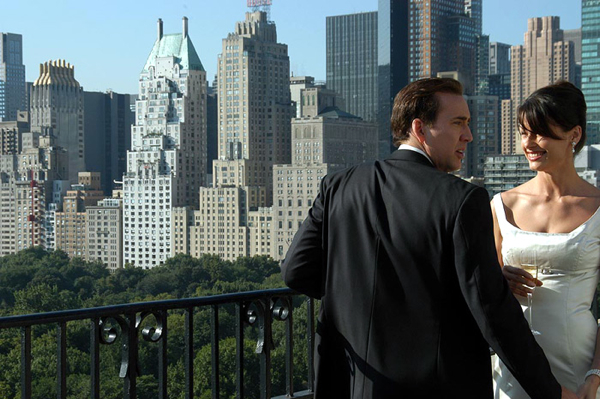Movie review by Greg Carlson
An often gripping tale of a successful, self-made, illegal arms dealer, “Lord of War” doesn’t always hit its target, but its unique subject matter makes it worth a look. Writer-director Andrew Niccol, who wrote “The Truman Show” and directed “Gattaca” and “Simone,” brings his knack for off-center concepts to a timely (and timeless) political conundrum: the grotesque abundance of small arms and the ease with which they are placed in the hands of the world’s poorest and most disenfranchised people. “Lord of War” employs a bleak sense of humor to mask some of its horror, but in the end, nobody will feel much like laughing.
Nicolas Cage plays Yuri Orlov, the son of hardworking Ukrainian immigrants in Little Odessa, where Yuri grows up with brother Vitaly (Jared Leto) in the shadow of mob violence. In a darkly comic epiphany, Yuri realizes that going into the gun business is like going into the restaurant business: people are compelled to kill one another in the same way they are compelled to eat. With little more than his significant self-confidence and skill with languages, Yuri transforms himself into the world’s premier firearms dealer, selling weaponry to any war-torn region that will meet his reasonable prices.
Yuri manages to convince himself – and likely a few of the audience members – that his occupation merely represents the realities of free market economics. What his buyers do with the munitions once they leave Yuri’s possession is entirely beyond his control. It’s a chilling display of cognitive dissonance, particularly when Niccol depicts executions, murder, and mayhem carried out by children scarcely large enough to shoulder Yuri’s reliable Kalashnikovs. Only dogged Interpol agent Jack Valentine (Ethan Hawke) believes that shutting down Yuri’s operation will extend some lives – if only for a day or two.
As a result of Niccol’s convoluted moralizing, “Lord of War” fails to deliver a knockout punch – the impressive special effects often fetishize and glorify the violence Niccol intends to deride. Additionally, Yuri’s voiceover narration reveals the protagonist to be wholly vacant on the inside as well as the outside. Niccol wants to show us that Yuri is almost completely numb to the chaos he so willingly abets, but the character’s amorality renders any sense of audience affinity nearly impossible. Vitaly, whose cocaine addiction helps him deal with his brother’s ugly profession, struggles to become Yuri’s conscience, but the strain is greater than either of them can bear.
For the most part, “Lord of War” unfolds with the same cynical detachment embraced by Yuri, and Niccol manages to address some issues more effectively than others. Underwritten is Bridget Moynahan’s role as Yuri’s wife, a woman who chooses to look the other way as long as the money keeps rolling in. A hair-raising relationship between Yuri and self-appointed Liberian president Andre Baptiste (Eamonn Walker) suggests that both men are possibly psychotic – Baptiste for his willingness to kill at the slightest provocation and Yuri for his willingness to do business in Baptiste’s dangerous company. “Lord of War” produces too much queasiness to be totally satisfying, but its ability to provoke thought should attract anyone interested in global politics.
